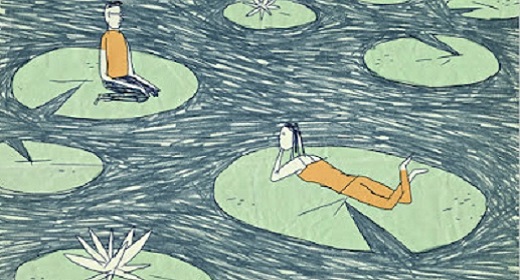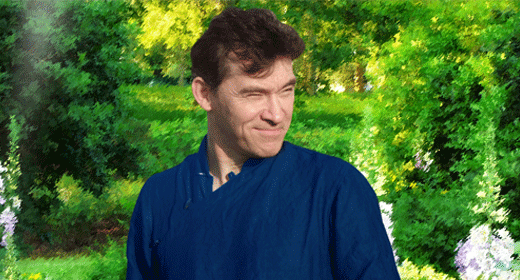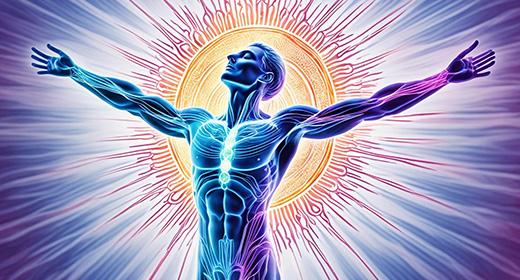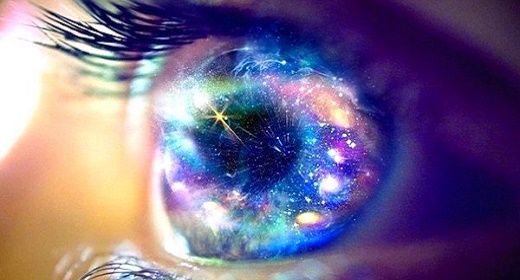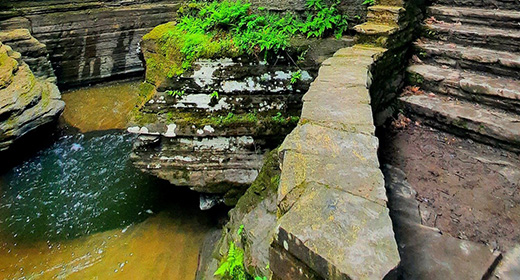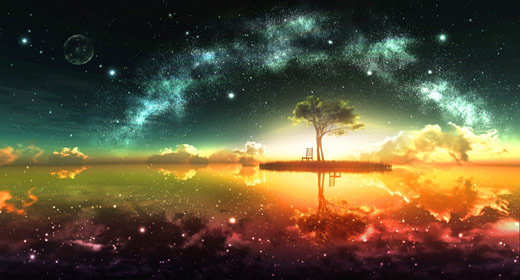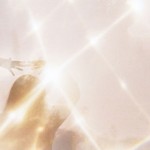by Alan Watts: The philosophy of the Tao is one of the two great principal components of Chinese thought…
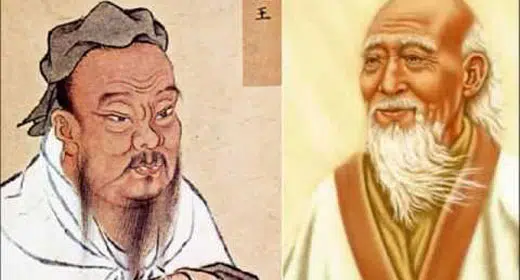
There are of course quite a number of forms of Chinese philosophy, but there are two great currents which have fairly molded the culture of China and they are Taoism and Confucianism. And they play a curious game with each other. Let me start by saying something about Confucianism originating with confluence of Confucius who lived approximately a little after six hundred thirty B.C.. He’s often supposed to have been a contemporary of Lao Tzu, who is the supposed founder of the Taoist way, but it seems more likely that Lao Tzu lived later than four hundred, according to most modern scholars. Confucianism is not a religion. It’s a social ritual. And a way of ordering society. So much so that the first great Catholic missionary to China Matteo Ricci was a Jesuit found it perfectly consistent with his Catholicism to participate in Confucian rituals because he saw them as something of a kind of national character as one might pay respect to the flag or something of that kind in our own times. But he found that Confucianism involved no conflict with Catholicism no commitment to any belief or dogma that would be at variance with the Catholic faith.
So Confucianism is an order of society and involves ideas of human relations including the government and the family based on the principle of what is called in Chinese rin, although Joshua will notice that I never get my tones right. Which is an extraordinarily interesting word. I’m going to put some of these things on the whiteboard. This is the word rin in Chinese, and it’s often translated benevolence, but that’s not a good translation at all. This word means human heartedness. That’s the nearest we can get to it in English. And it was regarded by Confucius as the highest of all virtues but one that he always refused to define. It’s above righteousness and justice and propriety and other great confusion virtues and it involves the principle that human nature is a fundamentally good arrangement. Including not only our virtuous side, but also our passionate side also our appetites in our way witness. The Hebrews have over a term which they call the yetzer hara Y E T Z E R H A R A. Which means the wayward inclination, or what I like to call the element of irreducible rascality, that God put into all human beings. And put it there because it was a good thing it was good for humans to have these two elements in them and so a truly human hearted person is a gentleman with a slight touch of rascality just as one has to have salt in a stew. Confucius said the goody good is other thieves of virtue. And Meaning that to try to be wholly righteous is to go beyond humanity. To try to be something that isn’t human. So this gives Confucian approach to life and justice and all those sort of things a kind of queer humor. Sort of boys will be boys attitude which is nevertheless a very mature way of handling human problems. It was of course for this reason that the Japanese Buddhist priests who visited China to study Buddhism especially as zen priests, introduced Confucianism into Japan, because despite certain limitations that Confucianism as and it needs it always needs the Tao philosophy as a counterbalance. Confucianism has been one of the most successful philosophers in all history for the regulation of governmental and family relationships. But of course it is concerned with formality. Confucianism prescribes all kinds of formal relationships; linguistic,ceremonial,musical, in education, in all the spheres of morals, and for this reason has always been treated by the Tao for being unnatural. You need these two components, you see and they play against each other beautifully in Chinese society. Roughly speaking mostly they confusion in the way of life is for people involved in the world. The Taoist way is to a of life is for people who get disentangled.
Now as we know in our own modern times there are various ways of getting disentangled from the regular lifestyle say of the United States. If you want to go through the regular lifestyle of the United States you go to high school and college and then you go into a profession or a business and you own a standard house and you raise a family and you have a car or two cars and do all that jazz. But a lot of people don’t want to live that way and there are lots of other ways of living besides that. So you could say that those of us who go along with the pattern correspond to the Confucians, and those who are Bohemians or bums or beatniks or whatever and don’t correspond with the pattern they are more like the Taoists. Because the Tao is really, actually in Chinese history,Taoism is a way of life for older people in. Lao Tzu, the name given to the founder of the Tao and means the old boy, and the legend is that he when he was born he was already had a white beard.
So, it’s sort of like this that when you have contributed to society when you’ve contributed children and brought them up, and you have assumed a certain role in social life. You then say Now it’s time for me to find out what it’s all about, who am I ultimately behind my outward personality. What is the secret source of things? And the latter half of life is the preeminently excellent time to find this out it’s something to do when you are finished with the family business. I am not saying that that is sort of unavoidable strict rule of course one can study the Tao when very young. Because it contains all kinds of secrets in it as to the performance of every kind of art or craft or business or any occupation whatsoever. But it does in in in China in a way it plays that role of a kind of safety valve. For the more restricted way of life that Confucianism prescribes. And the there is a sort of type in China who is known as the old rogue. He’s a sort of intellectual bum, often found among scholars who is admired very much and who had a type of character which had an influence on the development of the ideals of Zen Buddhist life. He is one who goes with nature rather than against nature.
Well now, first of all I’m going to talk about ideas which come strictly out of Lao Tzu’s book the Tao Te Ching And of course the basic thing in the whole philosophy is the conception of Tao. This word has many meanings and the book of Lao Tzu starts out by saying that the Tao which can be spoken is not the eternal Tao. Or you can, there’s a pun in there, but you can’t quite put into English. You can’t give all the meanings because the word Tao means both. The way for course of nature. Or of everything. It also means to speak.
So the actual opening phrase of the book. Following this word Tao is this. And the character is repeated again. You see and this this character means can be or can, able, something like that. So the way which can be then give it its second meaning spoken. Described out of. But it also means the way that can be weighed not W E I G H But W A Y E D. You know, you’d have to invent that word. The way that can be traveled perhaps is not the eternal way. In other words there is no. Way in which the Tao or following the Tao, there’s no recipe for it. I can’t give you any do it yourself instructions A.B.C. D. as to how it’s done. It is like when Louis Armstrong was asked What is jazz? he said “If you have to ask you don’t know.” Now that’s awkward, isn’t it. But we can gather what it is by absorbing sudden atmospheres and attitudes connected with those who follow it and from the art and the poetry and all the expressions and the anecdotes and stories. That illustrate the philosophy of the way. So this word, then, the way or the course of things is not you must understand there’s some Christian missionaries translate as the logos. Taking as their point of departure the opening passage of some John’s Gospel in the beginning was the word. Now if you look up the Chinese translation of the Bible it says in the beginning was the Tao. And the Tao was with God and the Tao was God. The same as in the beginning with God all things were made by it and without it was not anything made that was made.
So they have substituted Tao there, now that mimic a very funny effect on a Chinese philosopher, because the idea of things being made by the Tao is absurd but the Tao is not a manufacturer and it’s not a governor. It doesn’t rule as it were in the position of a king. Although the book without it being is written for many purposes, but one of its important purposes is as a manual of guidance for a ruler. And what it tells him is essentially ruled by not ruling. Don’t lauded over the people and so he says the great Tao flows everywhere both to the left and to the right. It loves and nourishes all things but does not lord it over them. And when good things are accomplished. It lays no claim to them. In other words, the Tao doesn’t stand up and say I have made all of you, I have filled this earth with its beauty and glory, fall down before me and worship. The Tao, having done anything you know always escapes. And is not around to receive any thanks or acknowledgement. Because it loves obscurity. And Lao Tzu said the Tao is like water. It’s always seeks the low level which human beings abhor. So it’s a very mysterious idea. Tao then is not really equivalent with any Western or Hindu idea of God because God is always associated with being the Lord. Even in India, the Brahman is often called the supreme lord although that with the term are strictly applicable to ishtar, the manifestation of Brahman in the form of a personal god. But rather than the Lord Krishna as his his son is the Bhagavad-Gita the song of the Lord of there’s always the idea of the king and the ruler attached but not in the Chinese Tao philosophy.
The Tao is not something different from nature, from ourselves, from our surrounding trees and waters and air. The Tao is the way all that behaves. And so the Chinese, the basic Chinese idea of the universe is really that it’s an organism. And as we shall see when we get on to Huang Tzu, or who is the sort of elaborator on Lao Tzu. He sees everything operating together. So that nowhere can you find the controlling center there isn’t any. The world is a system of interrelated components none of which can survive without each other. Just as in the case of bees and flowers. You will never find. These around in a place where there aren’t flowers and you will never find flowers around in a place where there aren’t bees or insects that do the equivalent job. And what that tells us secretly is that although bees and flowers look different from each other they’re inseparable. They, to use a very important Taoist expression, they arise mutually. This is one of the great phrases from the second chapter of Lao Tzu’s book where, he says this this character means to have or to be, and this next one is a very important character in Taoist philosophy it means no negative will in Chinese not to be, and then this curious expression for which we don’t have a really good corresponding idea in traditional Western thought. So, to be and not to be, mutually arise. This character is based on the picture of a plant. Something that grows out of the ground. So you could say, positive and negative, to be and not to be, yes and no. Light and dark arise mutually come into being. There’s no cause and effect, it’s not that relationship at all, it’s like the egg and the hen. So as the bees and the flowers co-exist, in the same way as high and low back and front and long and short, loud and soft. All those experiences are experience of all only in terms of their polar experience. So the Chinese idea of nature is that all of areas species arise mutually because they into depend and this total system of interdependence is the Tao. It involves certain other things that go along with Tao but this is this is this mutual arising is the key idea toe whole thing and it is, if you want to understand Chinese and Oriental thought in general it is the most important thing. To grasp. Because you see we think so much in terms of. Cause and effect we think of the universe today. In Aristotelian and Newtonian ways, and in that philosophy the world is all separated. It’s like a huge amount of nation of billiard balls. And they don’t move until struck by another or by a cue. And so everything is going to talk talk talk talk talk talk talk talk talk talk talk talk all over the place one thing starting up another in a mechanical way. But of course from the standpoint of twentieth century science we know perfectly well now that that’s not the way it works. We know enough about relationships to see that that mechanical model which Newton devised was all right for certain purposes. But it breaks down now because we understand relativity, and we see how things go together in a kind of connected net, rather than in a chain of billiard balls banging each other around.
So, in in the philosophy of the Tao, it is said, it’s always being said this is, you read this in every art book about Chinese art, that in Chinese painting, man is always seen as in nature, rather than dominating it. You’ll get a painting entitled, poet drinking by moonlight. And you see a great landscape and after some search with a magnifying glass at last you see the poet, stuck in a corner somewhere drinking wine. Whereas if we painted the subject poet drinking by moonlight the poet would be the most obvious thing in the picture there he would be dominating the whole thing the landscape of somewhere behind it, but of all the Chinese painters put man, I mean the painters of the great classical tradition. There are Chinese painters who specialize in family portraits and do these very formal paintings of someone’s ancestor sitting on a throne it’s quite a different category but the Taoist inspired painters, Zen inspired painters, have this view of man as an integral part of nature. Something in it just as everything else is in it flowers and birds. And not they’re sent into this world commissioned by some sort of supernatural being to come into this world and find it dominated it.
So then, the whole conception of nature is as a self regulating, self-governing, indeed democratic organism. But it has a totality, it all goes together and this totality is the Tao. So then we move to a second term that is extremely important. That the, expression. Tsu-ran, is the Bickley the term that we translate nature. When we translate Chinese. But this term expresses this whole point of view it doesn’t say nature, natura, which means in a way, class of things. It means literally self-so. What is so obvious itself what happens of itself and the spontaneity. And in the doubt edging early on Lao Tzu says the Taoist method is to be so of itself. Now we might translate that automatic where it not that the word automatic has a mechanical flavor. Tsu-ran, or [shizen?]as is called or she’s an in Japanese means spontaneous. Yes, i happens as your heart beats, you don’t do anything about it you don’t force your heart to beat you don’t make it beat it does it by itself. Now figure out a world in which everything happens by itself it doesn’t have to be controlled it’s allowed. The whereas you might say the idea of God involves the control of everything going on. The idea of the Taoist, is the ruler who abdicates and lets all the people trust all the people to conduct their own affairs to let it all happen. So this doesn’t mean you see that there isn’t a unified organism and everything is in chaos it means that the more liberty you give the more love you give the more you allow things in yourself and in your surroundings to take place, the more order you will have.

